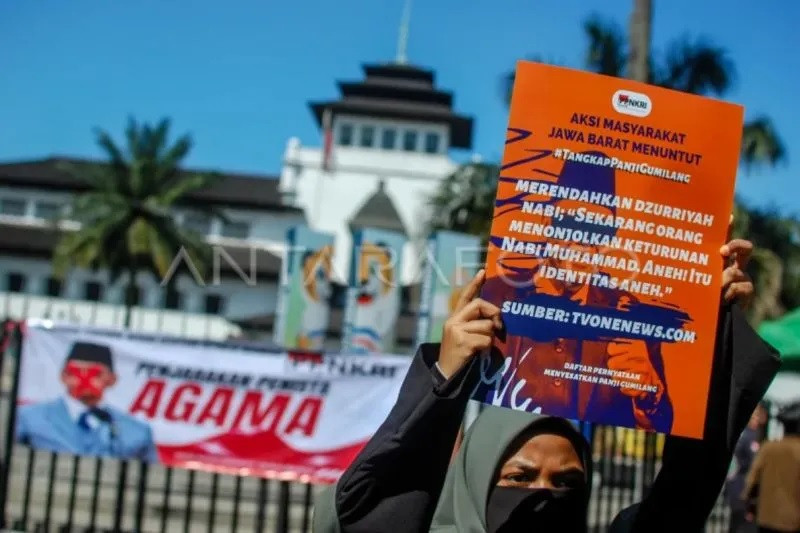Popular Reads
Top Results
Can't find what you're looking for?
View all search resultsPopular Reads
Top Results
Can't find what you're looking for?
View all search resultsBlasphemy or religious persecution?
We have seen this several times in the past, of the Indonesian Ulema Council (MUI) collaborating with the government in clamping down on followers of Islamic sects and doctrines they considered heretic.
Change text size
Gift Premium Articles
to Anyone
U
nder growing public pressure, the government has launched an investigation into allegations of blasphemy against Al-Zaytun’s pesantren (Islamic boarding school), with the Indonesian Ulema Council (MUI) claiming that the Islamic boarding school is teaching heresy. The government is also looking into terrorism charges, with claims that the founders of the school had connections with the long-outlawed Darul Islam movement that in the 1940 to 1950s launched a failed armed rebellion to turn Indonesia into an Islamic state.
The Attorney General’s Office, which is looking into the case, had better be careful. The fierce blasphemy campaign against Al-Zaytun, which has been gathering pace in the past month, both online and offline, would be considered religious persecution under international human rights laws.
Al-Zaytun in Indramayu, West Java, is one of the most economically successful Islamic boarding schools, with students developing their skills in running profitable farms and shops. The school has its own doctrine and is associated with neither Nahdlatul Ulama nor Muhammadiyah, the country’s two largest Islamic organizations that run many Islamic boarding schools.
Inaugurated by president B.J. Habibie in 1999, Al-Zaytun annually enrolls thousands of students from various parts of the country to join its preschool, primary, junior and high school as well as university institutions, a testimony of its popularity among parents seeking quality education for their children.
One allegation against Al-Zaytun is that it allows women to lead mixed-gender prayers, and during the Idul Fitri mass prayer in April, women and men were seen mixed rather than segregated. Another claim is that its founding principal, Panji Gumilang, encouraged the use of the Christian greeting Havenu Shalom Alachem (we bring peace upon you) in place of the Islamic Assalamualaikum.
The MUI says it is now drafting a fatwa on Al-Zaytun. Given the blasphemy claims it has made public, we know where this is heading. Although a fatwa is not binding, it would facilitate the Attorney General’s Office in building its case against the school principal and managers.
We have seen this several times in the past, of the MUI collaborating with the government in clamping down on followers of Islamic sects and doctrines they considered heretic. Their victims have included the Ahmadiyah and Shiite Islamic sects. In 2016, together they violently shut down Gafatar, a sect combining Islam, Christianity and Judaism, that was winning thousands of recruits, including many urban professionals. Who’s next?
The move began with a public online campaign, then followed by the mobilization of the masses, which forced the police to interfere to prevent violence. The court stepped in, but tragically, the last bastion of justice looked the other way even though the Constitution guarantees freedom of religion and the people’s right to practice their beliefs.
The 1965 blasphemy law has been turned into a powerful tool to suppress minority religions and sects. The way the legislation has been used against Ahmadiyah, Shiite, Gafatar and now possibly Al-Zaytun, it increasingly turns Indonesia into an arbiter of truth.
Instead of standing by the constitutional principle and protecting those being persecuted, the state succumbed to public pressures, now fiercer with the use of online campaigns in combination with mob mobilization, as we see against Al-Zaytun. While the state is not leading the persecutions, it is certainly enabling them when it could stop them.
Indonesia’s democracy is dangerously turning into a tyranny of the majority, with the government, the law enforcement agencies, the court and even the media entertaining the wishes of the largest and dominant groups in society, including in this particular case, Islam, more specifically Sunni Islam, which the majority in Indonesia follows.
These religious persecutions are not only violating international human rights laws and the constitution; they violate a chief principle in Islam, as stated in the Quran, verse 2:265, "There is no compulsion in religion, the right direction is clearly distinguished from the wrong.”











